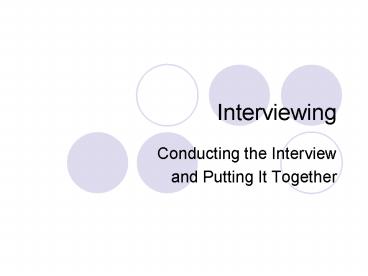Interviewing - PowerPoint PPT Presentation
1 / 24
Title:
Interviewing
Description:
Interviewing Conducting the Interview and Putting It Together Interview Object Activity Take out an object and a sheet of paper. Write 5 REALLY GOOD interview ... – PowerPoint PPT presentation
Number of Views:335
Avg rating:3.0/5.0
Title: Interviewing
1
Interviewing
- Conducting the Interview
- and Putting It Together
2
Interview Object Activity
- Take out an object and a sheet of paper.
- Write 5 REALLY GOOD interview questions you could
ask your object. - DO NOT answer the questions (that would be
weird)just write them - As we discuss Interviewing, you will be checking
these questions to determine if they are good
interview questions
3
Interview
- Formal conversation between a reporter and a
source
4
Human Element
- quotations and personal interpretations gathered
in an interview that make stories interesting to
readers and viewers
5
Quotation
- the exact words spoken by a source and cited as
such in a media story - Use open-ended questions
6
Primary Sources
- Person or document essential to the meaning of a
story - Every story has at least 1 primary source
- Some stories will have several
7
Primary Source
- So, youre writing a story about your object
(not really, but pretend you are) - What would your PRIMARY source for the story be?
- Your OBJECT
- On your paper, write Primary (Object)
- Example Primary iPhone 5
8
Secondary Sources
- Person or doc that adds info and interest to a
story but is not essential to it - Sources can be people or physical sources like
books, surveys, budgets, etc.
9
Secondary Source
- Now that your primary source (your object) has
spent some time in your bookbag or purse today,
what is a secondary source you could use to find
out more information about your object? (Source
could also be at home) - On your paper, write Secondary (Object)
- Example Secondary earbuds
10
Researching
- 1st Find out who/what are primary sources
- 2nd Make a list of sources
- 3rd Do as much research online, in library, etc.
as possible to prepare for interview - You never want to ask questions in an interview
that you could answer with research
11
Research
- Gather enough background info in your research to
write questions that will add valuable info to
your story - Youll get better quotes this way too
12
Could you have researched?
- Look over your list of questions
- Are any of your questions something that you
could have answered if you had done a little
research? - Put a star by any question you could have
answered with research
13
Preparing Questions
- Use the 5Ws and H to organize your questions
- Generate a list of as many questions as you can
possibly think of - Multiple Who? and What?
14
Open-Ended Questions
- Open-ended questions ask for an opinion or
interpretation from your source. - They require your source to expand on basic info.
- Its all in the follow through
- Follow-up with questions like Why?
15
Yes-No Questions
- Not good to ask in an interview
- Generate only yes-no answersthis gives you
nothing as the reporter - Yes-No Open-Ended
- Did you sign the bill? Why did you sign the
bill?
16
Were your questions open or closed?
- Look over your questions
- Underline any questions that would have resulted
in a yes or no answer - Underline any questions that would have resulted
in a ONE WORD answer - Believe it or not, those are also closed
questions
17
Interviewing 101
- Before good research, prepare good questions
- During use a tape recorder (w/permission), but
do not rely on itTAKE GOOD NOTES (abbreviate) - End confirm spelling of name, title.
18
Interviewing 101
- End confirm where you can reach them and when if
you have ??? - Who else can I talk to about this?
- Why is that person a good source?
- After write up your notes ASAP
- Be thorough and date them
- Keep them on file
19
Interviewing 101
- Be a good observer record details about
- surroundings (clean desk, travel pictures)
- mannerisms (talk w/hands, smiling, frowning)
20
1) Review and Modify Questions
- Look over questions
- Questions marked with a (star) are those that
could have been answered with research - Next to the question write where you could have
found this info - AVOID search engines (No Google, Bing, etc)
21
2) Review and Modify Questions
- Underlined questions indicated those that were
closed questions - Rewrite those into OPEN-ENDED questions
- Example Do you like sitting on my desk?
- Rewritten How do enjoy spending your time?
22
3) Review and Modify Questions
- Choose one question that you believe would have
generated a FOLLOW-UP question - Write a follow-up question
- Example How do enjoy spending your time?
- Follow-up What is it about surfing the internet
that you enjoy - Hint This question will require you to think a
bit about what the answer would be to the first
question
23
Supporting Info
- Write one question you could ask of your
SECONDARY SOURCE - Example (Earbuds) What is your favorite song to
listen to? - Dont forget the rules of questions
- Open-ended
- Should draw an opinion of some sort
24
HOMEWORK
- On a separate sheet of paper, write the
following - Your name
- Grade
- Age
- Schedule
- Extra Curricular Activities
- Tomorrow we conduct classmate interviews, you
will be partnered with someone































